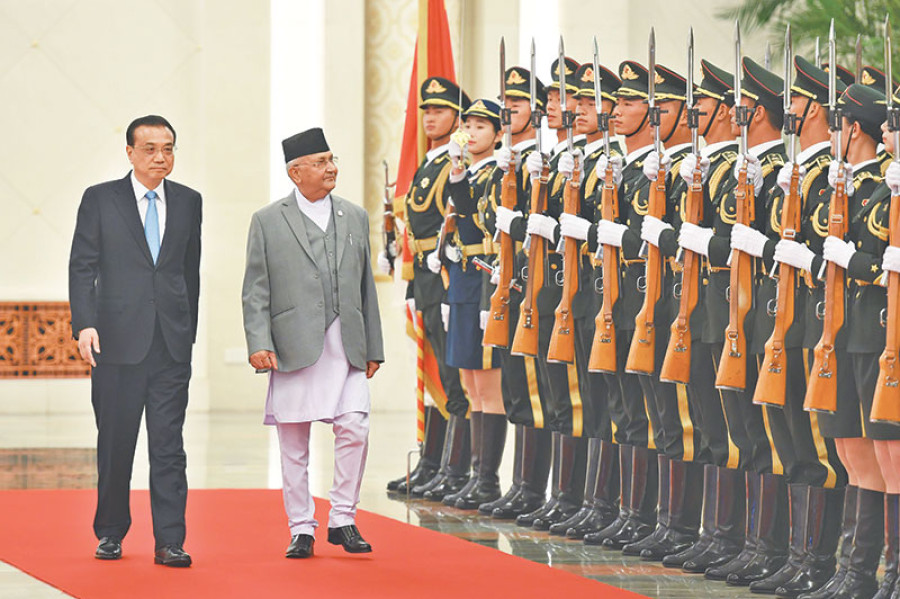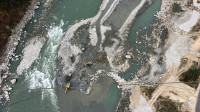National
PM Oli winds up Beijing visit on high note
Nepal and China have signed a landmark accord to develop a cross-border railway line that will connect the Tibetan town of Kerung with Kathmandu, calling the Cooperation for Railway Connectivity “as the most significant initiative in the history of bilateral cooperation”.The two sides signed the memoranda of understanding on Thursday following hour-long delegation-level talks at the Great Hall of the People.
Akhilesh Upadhyay
Nepal and China have signed a landmark accord to develop a cross-border railway line that will connect the Tibetan town of Kerung with Kathmandu, calling the Cooperation for Railway Connectivity “as the most significant initiative in the history of bilateral cooperation”.
The two sides signed the memoranda of understanding on Thursday following hour-long delegation-level talks at the Great Hall of the People.
The talks were led by Prime Minister KP Sharma Oli and his counterpart Li Keqiang, who were seen making warm exchanges standing over the table, as senior officials from the two sides signed 14 MoUs and letters of exchange. This follows nine agreements signed by Nepali and Chinese public and private sector companies on Wednesday, with major ones being: Investment Board Nepal (IBN) and Huaxin Cement Company of China to develop a Rs15-billion Huaxin Narayani Cement; Butwal Power Company and Sichuan Investment Group (SCIG) to work together on Marsyangdi Cascade to produce 1,000 megawatt electricity; Nepal Electricity Authority and China’s State Grid Corporation will construct a 159-km Kerung-Galchhi transmission line.
The latter will be the first Nepal-China cross-border transmission line that will allow Nepal and China to trade power. Officials here say a strong infrastructure of cross-border power connectivity will link Nepal in the regional power grid that already encompasses China, Thailand, Myanmar, Laos, Cambodia and Thailand.
Nepali officials stressed that the MoU (yet to be made public) on the railway project makes a strong commitment towards its ‘timely completion’. The joint statement released at the conclusion of the Beijing leg of the prime minister’s visit, however, kept short of offering specifics on the railway project.

“This is mainly due to a great degree of technical details involved in such a huge infrastructure project,” said an official. “Because the project entails massive engineering works, it would be far wiser to discuss specifics once you have the detailed project report.”
Foreign Minister Pradeep Gyawali told reporters on Wednesday that the DPR of the Kerung-Kathmandu railways would be completed in another one-and-a-half years or so and construction in five more years.
Both Nepal and China have stressed that the railway project is the standout achievement of the current visit. “They [the two sides] have underscored it [the railway project] as the most significant initiative in the history of bilateral cooperation and believed that it would herald a new era of cross-border connectivity between the two countries,” said the joint statement.
In a visit where connectivity was the political buzzword, the two sides agreed to encourage Nepali and Chinese airlines to operate additional direct flights between the two countries. They will also speed up the construction of the Pokhara International Airport.
The two sides have expressed satisfaction at the successful commercial operation of China-Nepal cross-border optical fibre cable. In January, Nepal Telecom and China Telecom Global launched their services after laying an optical fibre cable between Kerung and Rasuwagadhi. This ended India’s decades-long monopoly on Nepal’s cyber connectivity.
Prime Minister Oli, who started his China visit on June 19, travels to Lhasa early Friday for staying there for two days. In Tibet, he will visit Lhasa, the capital of the Chinese autonomous region. Home Minister Ram Bahadur Thapa, Foreign Affairs Minister Pradeep Gyawali, Energy Minister Barsha Man Pun and Physical Infrastructure Minister Raghubir Mahaseth are part of the high-level delegation. The latter signed the ambitious railway agreement on behalf of Nepal.
There is a strong sense of political optimism about the visit, which was best reflected when Oli and Chinese President Xi Jinping met on Wednesday. They both congratulated each other for their successful election; Oli seemed able to convey to the Chinese leadership that they can now expect a level of policy stability in Nepal. In 2017, Xi was unanimously re-elected as the chairman of the Chinese Communist Party.
In a warm and cordial atmosphere, leaders of the two countries reached broad understanding through in-depth exchange of views on further cementing traditional friendship and deepening cooperation for mutual benefit, the joint statement observed about the developments of the last two days. China Daily covered the talks between Oli and Xi on its front page on Thursday.
The Chinese side also congratulated Nepal on the historic and epoch-making political transformation and beginning of a new era of political stability and economic development, according to the statement. On Thursday, Prime Minister Li in person, and the statement later, expressed confidence that the Oli government would be able to realise the goal of ‘Samriddha Nepal, Sukhi Nepali’ (Prosperous Nepal, Happy Nepali) and China expressed its “full commitment to assist Nepal in realising its development goals within its capacity”.
The Nepali side reiterated its firm commitment to the one-China policy with Tibet and Taiwan affairs as being China’s internal affairs, and the determination on not allowing any anti-China activities on its soil. For its part, China also reiterated its firm support to Nepal’s independent choice of its social system and development path, and the efforts made by Nepal in upholding its sovereignty, independence, territorial integrity, national unity and stability. “Prime Minister Oli’s visit came at a time when both Nepal and China have entered a new era,” said Deputy Foreign Minister Kong Xuanyou. “Therefore it is of special significance.”
Though it was not explicitly stated which of the China-assisted projects fall under BRI, the two sides agreed to intensify implementation of the MoU on Cooperation under the Belt and Road Initiative to enhance connectivity, encompassing such vital components as ports, roads, railways, aviation and communications within the overarching framework of trans-Himalayan Multi-Dimensional Connectivity Network. On international diplomacy, the two sides agreed to strengthen cooperation in the UN and other multilateral forums. China seemed keen for Nepal to have Observer Status in the Shanghai Cooperation Organization (SCO), provided there is consensus with other member states. They also agreed to enhance coordination and cooperation within the SCO, Saarc and other regional cooperation mechanisms. “For the first time perhaps in the history of Nepal-China ties, we have held frank discussions on regional and international issues,” said a senior government official. “There is no reason why we shouldn’t discuss Saarc, regionalism and India with China. It only shows our confidence in each other and regional interdependence means events in one country impact many others.”




 11.42°C Kathmandu
11.42°C Kathmandu














